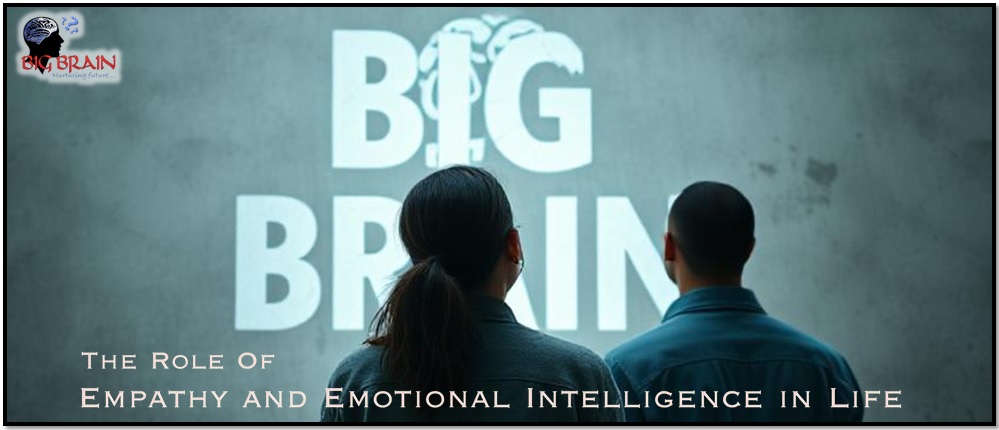Introduction
Empathy and emotional intelligence (EI) play a fundamental role in shaping our personal and professional lives. These qualities enable us to connect with others, understand emotions, and respond effectively to different situations. Whether in relationships, workplaces, or social interactions, the ability to empathize and manage emotions contributes to personal growth, stronger connections, and overall success in life.
Understanding Empathy and Emotional Intelligence
Empathy is the ability to recognize, understand, and share the feelings of others. It allows individuals to step into someone else’s shoes and see the world from their perspective. Emotional intelligence, on the other hand, is the broader ability to identify, manage, and regulate emotions in oneself and others. It encompasses self-awareness, self-regulation, motivation, empathy, and social skills.
Both empathy and EI help individuals navigate social complexities, build meaningful relationships, and make informed decisions.
The Importance of Empathy in Life
Empathy is a crucial skill that influences our interactions and decision-making in various aspects of life:
- Strengthening Relationships
Empathy fosters deeper connections by allowing individuals to understand and validate each other’s feelings. In personal relationships, it helps resolve conflicts, improve communication, and build trust.
- Enhancing Communication
Effective communication is not just about speaking; it is also about listening and understanding. When people feel heard and acknowledged, they are more likely to engage positively in conversations.
- Promoting Kindness and Compassion
Empathy encourages acts of kindness, as people who understand the struggles of others are more likely to offer support and assistance.
- Reducing Conflicts
Many conflicts arise due to misunderstandings and lack of empathy. By considering other perspectives, individuals can address issues constructively rather than reacting impulsively.
- Encouraging Inclusivity and Social Harmony
Empathy helps break down social and cultural barriers. It promotes acceptance, reduces biases, and encourages collaboration among diverse groups of people.
The Role of Emotional Intelligence in Life
Emotional intelligence is equally important in shaping personal and professional success. It influences how we handle stress, interact with others, and make decisions.
- Self-Awareness and Personal Growth
Being emotionally intelligent means recognizing one’s emotions and understanding their impact. Self-awareness allows individuals to make better choices, set realistic goals, and work on self-improvement.
- Managing Stress and Emotions
Life is full of challenges, and the ability to manage emotions plays a key role in overcoming difficulties. Emotional intelligence helps individuals remain calm, adapt to changes, and find solutions during stressful situations.
- Enhancing Leadership and Teamwork
Leaders with high emotional intelligence inspire and motivate others. They understand team dynamics, foster collaboration, and create a positive work environment.
- Improving Decision-Making
Emotionally intelligent individuals are better at analyzing situations without being overwhelmed by emotions. They consider different perspectives and make well-informed choices.
- Strengthening Social and Professional Relationships
In both personal and professional life, emotional intelligence helps individuals navigate relationships effectively. It enables them to resolve misunderstandings, communicate assertively, and maintain healthy boundaries.
How to Develop Empathy and Emotional Intelligence
Empathy and emotional intelligence are skills that can be nurtured and developed with conscious effort.
- Practice Active Listening
Genuinely listening to others without interrupting or judging fosters empathy. Focus on understanding their perspective rather than just responding.
- Cultivate Self-Awareness
Regular self-reflection helps individuals recognize their emotions and understand how they affect their actions and decisions.
- Manage Emotions Effectively
Developing self-control and practicing mindfulness can help individuals respond to situations thoughtfully instead of reacting impulsively.
- Develop Perspective-Taking Skills
Trying to see the world from another person’s viewpoint enhances empathy and allows individuals to relate better to others.
- Engage in Meaningful Conversations
Having open and honest discussions about emotions and experiences can strengthen emotional intelligence and deepen relationships.
The Impact of Empathy and Emotional Intelligence in Different Areas of Life
- In Personal Relationships
Strong relationships are built on understanding, trust, and effective communication. Empathy helps partners, family members, and friends connect on a deeper level and support each other through life’s challenges.
- In the Workplace
Empathy and emotional intelligence contribute to a positive work culture. Employees who feel understood and valued are more engaged and productive. Leaders with high EI are better at managing teams, resolving conflicts, and fostering collaboration.
- In Leadership and Decision-Making
Great leaders possess high emotional intelligence. They inspire others, handle challenges with resilience, and make ethical decisions that benefit both individuals and organizations.
- In Social and Community Settings
Empathy promotes social harmony by encouraging understanding and cooperation among people from different backgrounds. It helps reduce prejudice and build inclusive communities.
Conclusion
Empathy and emotional intelligence are essential life skills that influence how we interact with others, handle challenges, and achieve personal and professional success. By developing these qualities, individuals can foster meaningful relationships, make better decisions, and create a more compassionate and understanding world. Prioritizing emotional intelligence and empathy leads to a fulfilling and impactful life.
Regards
Team – BIG BRAIN
www.bigbrain.co.in

